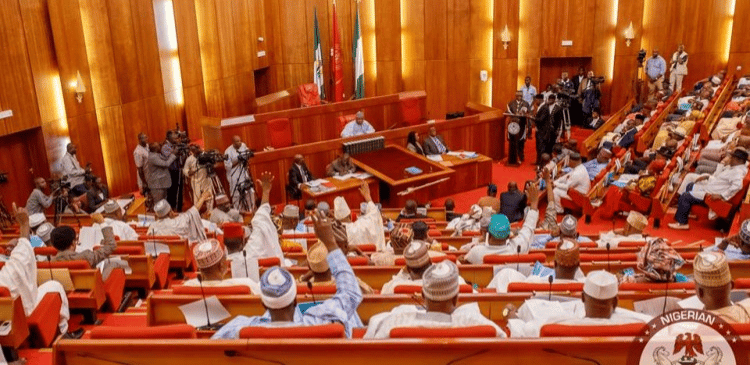
The Nigerian Senate has considered and passed the 2025/2027 Medium Term Expenditure Framework (MTEF) and Fiscal Strategy Paper (FSP) forwarded to it by President Bola Ahmed Tinubu.
The passage followed the consideration of a report presented by the Chairman of the Senate Committee on Finance, Senator Sani Musa, during plenary on Wednesday.
The Upper Chamber approved the expenditure framework with a total spending of ₦47.9 trillion and a new borrowing plan of ₦9.22 trillion which includes both domestic and foreign borrowings.
Presenting the joint committee report of the Committees on Finance and National Planning and Economic Development at plenary, Senator Musa said that the MTEF/FSP projected oil benchmark prices proposed for these three years are achievable.
He said the MTEF/FSP projected oil benchmark prices of USD75, USD76.2 and USD75.3 per barrel for 2025, 2026 and 2027 respectively.
Other recommendations in the paper are: “The three-year projections for domestic crude oil production had a significant increase from 1.78 mbpd in the preceding year to 2.06, 2.10 and 2.35 for the subsequent years of 2025, 2026 and 2027.
(iii) Some critical agencies such as NNPC, NLNG, Immigration Services and others that are relevant to the attainment of set revenue targets engage in Public Private Partnership and Joint Venture Arrangements that are inimical to the revenue growth of the Country;
(iv) Historical non-remittance of operating surpluses into the Federation Account by the NNPCL due to what it called under recovery with the claim that the federating units owed it the sum of Ten Trillion Naira and many others.
The lawmakers approved the framework with an exchange rate of ₦1,400 to a dollar and adopted the oil prices of $75, $76.2, and $75.3 per barrel for 2025, 2026, and 2027 respectively.
The framework also has daily oil production fixed at 2.06 million, 2.10 million, and 2.35 million barrels for the three years.
Debt service was valued at ₦15.38 trillion, pensions, gratuities, and retirees’ benefits at ₦1.443 trillion, and the fiscal deficit at ₦13.08 trillion.
The GDP growth rates were projected at 4.6 per cent, 4.4 per cent, and 5.5 per cent for 2025, 2026, and 2027 respectively.
“Capital expenditure is projected at ₦16.48 trillion, which is exclusive of transfers; statutory transfers stand at ₦4.26 trillion; the sinking fund is projected at ₦430.27 billion, while total recurrent (non-debt) expenditure is projected at ₦14.21 trillion,” the report read.
Senator Musa therefore urged the House to consider the report of the committees and approve the recommendation therein.
The approval of the 2025-2027 Expenditure, Fiscal Strategy Paper will enable President Tinubu present the 2025 budget proposal to the joint session of the National Assembly.
The approval will also avail various government Ministries, Departments and Agencies (MDAs) the opportunity to present justifications on their economic and fiscal estimates contained in the period under review.
According to President Tinubu, the 2025-2027 MTEF/FSP was approved at the Federal Executive Council meeting on November 14, 2024.
He further explained that the Nigerian Federal government’s 2025 budget was prepared based on the parameters and fiscal assumptions outlined in the approved MTEF/FSP.
President Bola Tinubu had few weeks ago submitted the Medium Term Expenditure Framework and Fiscal Strategy Paper to the National Assembly for consideration.
President Tinubu, who said the 2025-2027 MTEF/FSP was approved at the Federal Executive Council meeting further explained that the 2025 budget was prepared based on the parameters and fiscal assumptions outlined in the approved MTEF/FSP.
The MTEF is a projection of a three-year spending plan of the federal government.
The nation’s budget is predicated on this framework.
Emmanuel Ukoh










